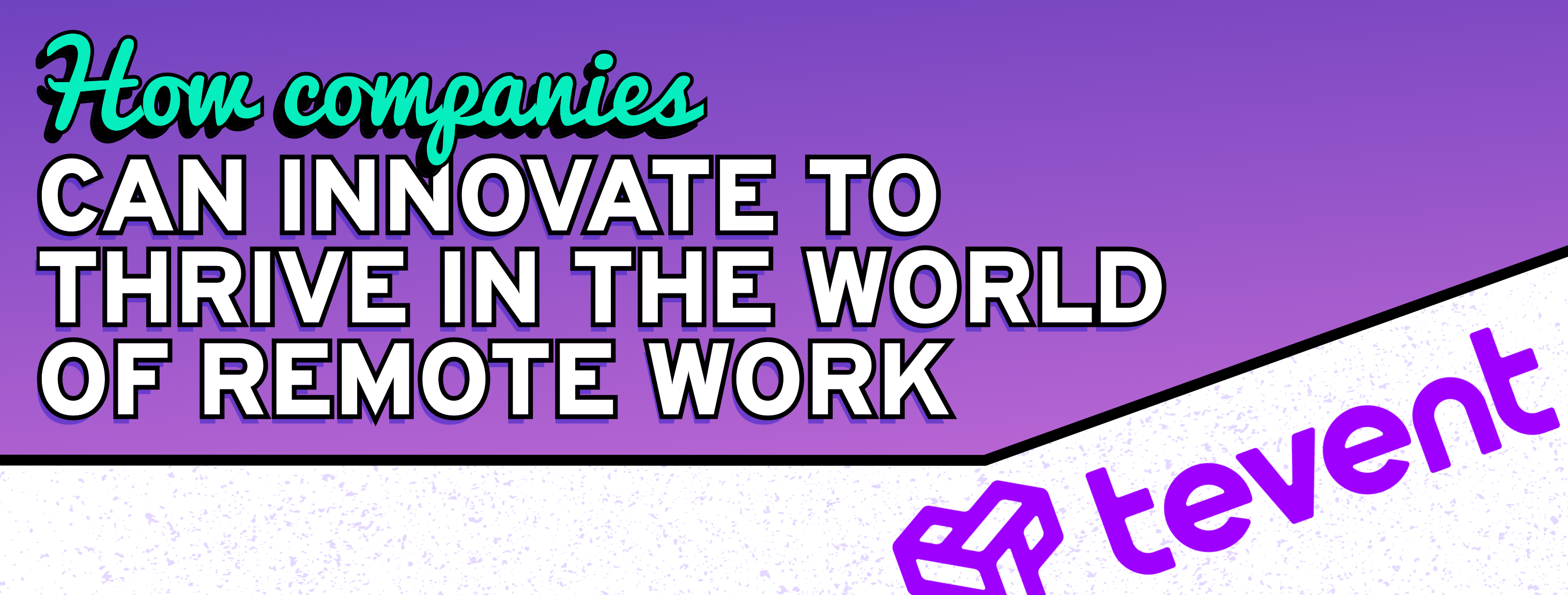How Companies Innovate To Thrive In The World Of Remote Work
Partner collaboration with Online Event and Webinar Platform, Tevent
22nd Jun 2023

The shift towards remote work has revolutionised how we work. Companies worldwide are embracing flexible work arrangements, digital transformation, and a heightened focus on employee well-being to adapt to the needs and expectations of the modern workforce.
We’ll explore three innovative ways companies are adjusting to virtual work and discover how these strategies can enhance productivity, engagement, and work-life balance.
1) Embrace flexibility for enhanced productivity
Remote work, among other flexible work arrangements, provides the benefit of increased freedom and flexibility. Companies that recognise the value of autonomy are embracing this approach to build loyalty, boost productivity and ultimately give employees the work-life balance they crave. If that isn’t reason enough:
- 92% of people express a desire to work more flexibly - so there’s growing demand!
- Companies like Mars UK, Virgin Media O2, Multiverse and Huel are among some of the top brands offering workplace flexibility to stay ahead of the curve and meet the demands of the candidates they wish to attract.
- 51.67% of candidates are in search of fully remote roles (with no office), and 34.50% are in search of remote first roles (with an office), according to data collected by Flexa.
Here at Tevent, we offer a range of flexible working options which have been foundational in building an energised, motivated, and productive team. From a 4-day work week and flexible maternity/paternity leave, to a generous WFA scheme which has seen the team work in exciting locations like Madeira, Jordan, Italy and Portugal, the various schemes have encouraged a unified and accountable structure. Team members experience a sense of fulfilment and agency in our work, where we want to contribute, work hard, and keep the ship sailing for ourselves and our clients!
2) Build connections and boost collaboration
Although remote work is loved by many, it can contribute to feelings of isolation. Forward-thinking companies have adapted in order to introduce new ways that keep employees connected with one another from a distance.
But how? One way is by harnessing the power of virtual team-building activities.
With 87% of remote workers stating they feel more connected to their colleagues through virtual team building - it’s a no-brainer.
Here are just a few examples of virtual activities that you could use within your teams:
- "Donut" - Slack has introduced "Donut", a virtual game that randomly pairs colleagues for a virtual coffee or lunch breaks. This initiative aims to build connections and allows employees to meet new people within their company,
- The Escape Game - according to the remote-team-building facilitator, The Escape Game, 9/10 team leaders that were surveyed said that their team's communication improved after their experience, and 10/10 team leaders said morale increased after their game experience. Even big brands like Netflix, Google, and Pepsi are also utilising virtual game events to help close the divide.
- ‘Virtual Pubs’ - at Tevent, Thursdays at 4pm have become an enshrined time to connect as a team, share a couple of long-distance beverages, and bond over rounds of Scribbl or Among Us. It’s not really about the game, but prioritising time to have carefree chats - ranging from fun and philosophical to absurd and downright ridiculous - which add an essential and informal dimension to our relationships.
3) Prioritise employee well-being
Remote work can blur the boundaries between work and personal life, leading to increased stress and burnout. Companies that emphasise employee well-being can help maintain a healthy work-life balance to reduce the risk of mental and physical health issues and create a team that thrives.
And here’s the thing:
- Data from Flexa showcases 34.7% of candidates want an employer that offers mental health support, and 29.6% would like the option of a well-being allowance.
- According to a study by VirginHealthMiles, 77% of employees believe that wellness programs have a positive impact on their well-being while working remotely.
- Specsavers confirmed the renewal of its Headspace subscription - which includes access for workers in all parts of the supply chain - following positive feedback. Specsavers’ well-being and inclusion lead, Steven Evans, said: “To support our colleagues and their wellbeing, we want to ensure we continue to provide new and existing offerings to keep them feeling positive about their well-being. From Canada to Hong Kong and everywhere in between, colleagues are benefitting from better focus and sleep and making use of the mindfulness and meditation courses.”
As we all continue to adapt to remote work, companies are embracing change and exploring innovative ways to support their employees' success and well-being.
According to McKinsey & Company, companies that prioritise employee well-being and implement flexible work arrangements whilst having the right policies and strategies in place are not only more productive but also experience higher employee satisfaction and retention. Creating a transformative culture of work that is set up for success and hitting those all-important company targets, it’s a win-win.
Companies that have embraced innovation and adapted their strategies to the world of remote work have reaped the benefits of increased productivity, employee satisfaction, and access to a broader talent pool.
As flexible working continues to shape the future of work, companies must remain agile and proactive in their pursuit of creating an innovative and collaborative work culture.